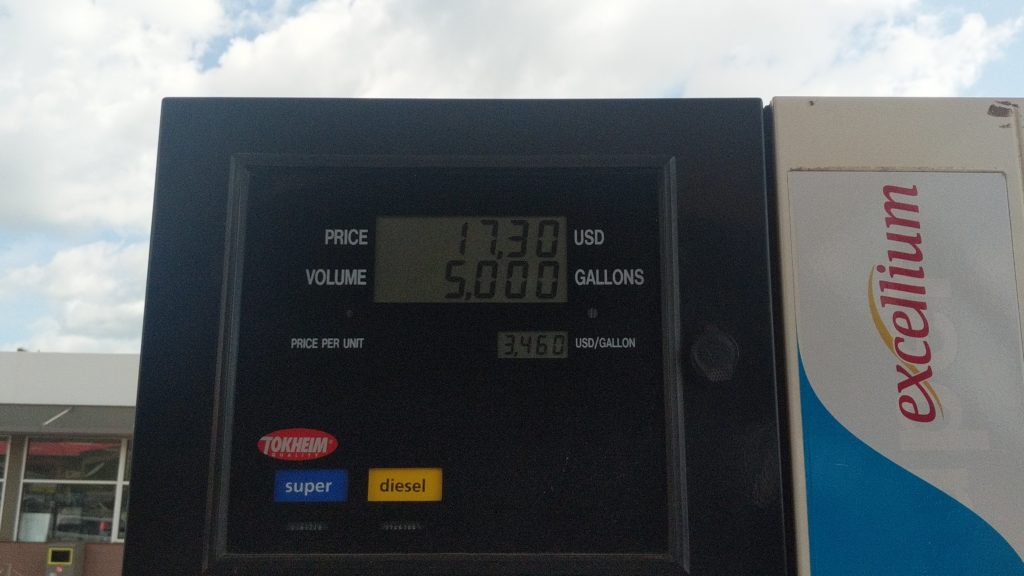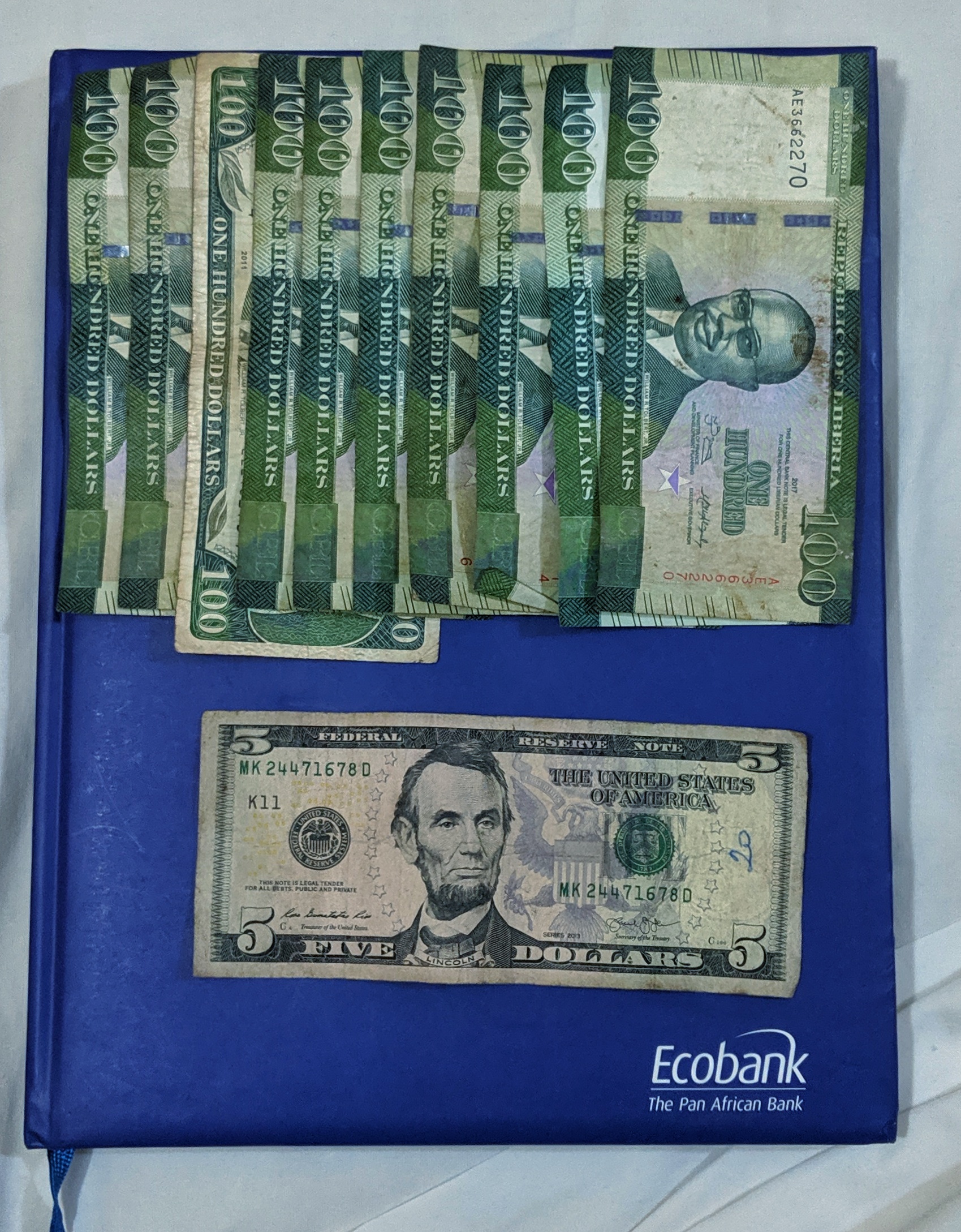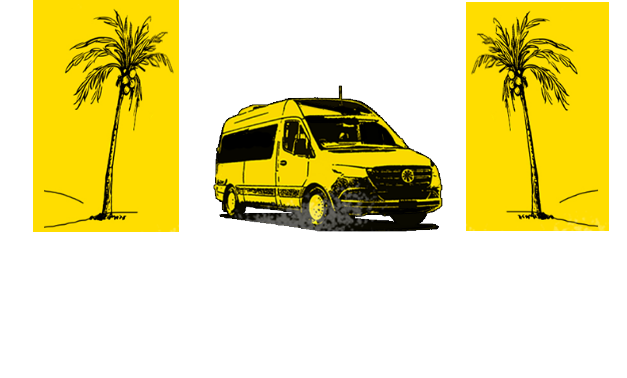“It’s issuing only $100 bills,” a random stranger told me on our first night in Liberia. He’d just made a withdrawal and I was next in line.
We were spending the night in Yekepa, a mining town. When that slot opened, it spat $100 bills. American money. Our hotel charged in USD – $40 per room, a healthy discount. Thank you, Melvin my man in the Star Boy shirt.
Everyone was hungry, so we went to the only open restaurant at 9 PM, a well-lit kitchen.
“Over 200 people are fed here every day,” one of the Indians running the place told us.
They charged $10 per person – an eat-all-you-can of sorts.
One full night of transactions in this country and no Liberian dollars like my Social Studies teacher promised.
The next day, we had to buy sim cards, so off we went into the market. The shop we stopped at is run by Izu, a Nigerian from Imo State. No surprises there.
Each sim card cost 500 Liberian Dollars. Each airtime scratch card costs $1. This is where the currency gymnastics began. But guess who wants to play? Me.
“Izu,” I said, “I want to change $10 to LD. How much will you give me?”
“$1 for 210 Liberian Dollars.”
I changed $50. This is what 10,500 Liberian Dollars look like.
At Ganta – about 3 hours from Yekepa when you subtract getting stuck in the mud and a whole community coming to help you – we had to buy fuel.
The giant sign outside the filling station said petrol went for 710 Liberian Dollars per gallon. The actual pump charged in US dollars; almost $1 per litre when you do the math.

“If you’re buying above 3750 Liberian dollars,” the courteous fuel attendant said, “please pay in USD.” That’s what we did.
At the border office in Ganta, some payments are made – over $50. When we got hungry and had to go eat at a Buka where they tried to kill us with the large portions, we paid roughly 500 Liberian Dollars per person.
Over 4 hours later – when you add Immigration checkpoints – we were greeted into Monrovia with rush hour traffic. That’s good enough time to go withdraw money. And what did the ATM dispense?
We reached our hotel, more USD. And I couldn’t help but ask the people at the reception, “Are there any ATMs in this country that issue Liberian Dollars?”
“I’m not sure,” John said, “but we accept only USD.”
I asked Princess too, but her answer was a different kind. “I’ve never used an ATM before.”
When it was time to pay and we wanted to use their POS – the first one we’d seen in the country – things got a little tricky.
“I had to show her how to use it,” Toke said later. “I found that very interesting.”
Toke finds everything interesting, but what I found interesting in this case is Princess. She couldn’t use a POS, not because she wasn’t smart. She’d just never had to use it.
What she’s in fact used, like most Liberians in Monrovia and in most places around the country – no matter how difficult they’re to reach – is mobile money. The biggest forces for mobile money are MTN and Orange, both telcos — the places POS terminals can’t reach yet, telcos will.
It works like this. I asked my friend, Dounard, to demonstrate. He’s a law student here in Liberia.
“Everyone has a mobile money account,” he started talking in his most Liberian accent, where the last letter of every word is not necessary.
“So ah have it, the person you want to send it to will have it – it’s connected to phone numbers. When I want to send you money, I go to an agent, tell them how much I want to send, then I give them the money, say $20. In a few moments, the other agent will receive it. When the other person wants to collect the money, they go to the agent in their area. Show them a code, and collect their cash. The agents get a small commission.”
If an agent does mobile mobile transactions, he most definitely holds cash. If he holds cash – in Liberian dollars and USD – then he’s most likely a cash exchange pointman.
That kind of explains what happened at breakfast. We – Captain and I – went out to a roadside food place. Lapper-be-door; the door is a wrapper, basically. Kate at the shop gave me Jollof Rice and Fish for 800 Liberian Dollars. Captain had his own Jollof with three drumsticks for 350 Liberian Dollars. 1,150 in total.
When I pulled out $5 to pay, she sighed, collected the money, and went to the next shop to change it to Liberian dollars. Then I paid her in Liberian dollars.
“For restaurants,” Dounard said, “pay USD. For Lapper-be-door, pay in Liberian dollars.”
It extends to a larger part of Liberian soceity.
“When you go to the markets,” Christina Kojo said, “everyone transacts in Liberian dollars.”
Sometime in the late nineties during World War II – Liberians call their civil wars World War – Christina Kojo entered Nigeria as a refugee. Today, she’s head of E-banking at Ecobank Liberia.
“Adoption of technology has increased in the past one year. Our ATMs are beginning to dispense Liberian dollars. People are more interested in POSes, businesses. A lot of people like to hold their money and keep it under their beds. But that’s changing.”
“USD has always been a thing in Liberia,” Dounard said, “since I was born at least. Water bills are paid in USD. Power bills are paid in USD.”
After the war, the country was flushed with a ton of relief money to rebuild Liberia. Sirleaf Johnson’s Liberia where she was President for 12 years saw a lot of that – a presidential term is 6 years.
The Liberian dollars was significantly more valuable than it is now. Two years ago, it used to be about 100 to 120 LD to the USD, according to Dounard.
Today, I changed mine at 210 LD to the dollar. What does this mean in the broader context? The Liberian dollars is losing value, obviously. “It wasn’t even as high as 210 at the beginning of the year,” Dounard said.
Kate didn’t have any opinions about it though. She just asked if we were going to drop by again for dinner. We’ll still be in Liberia, sounds like a great idea to me.






 Previous post
Previous post Next post
Next post



